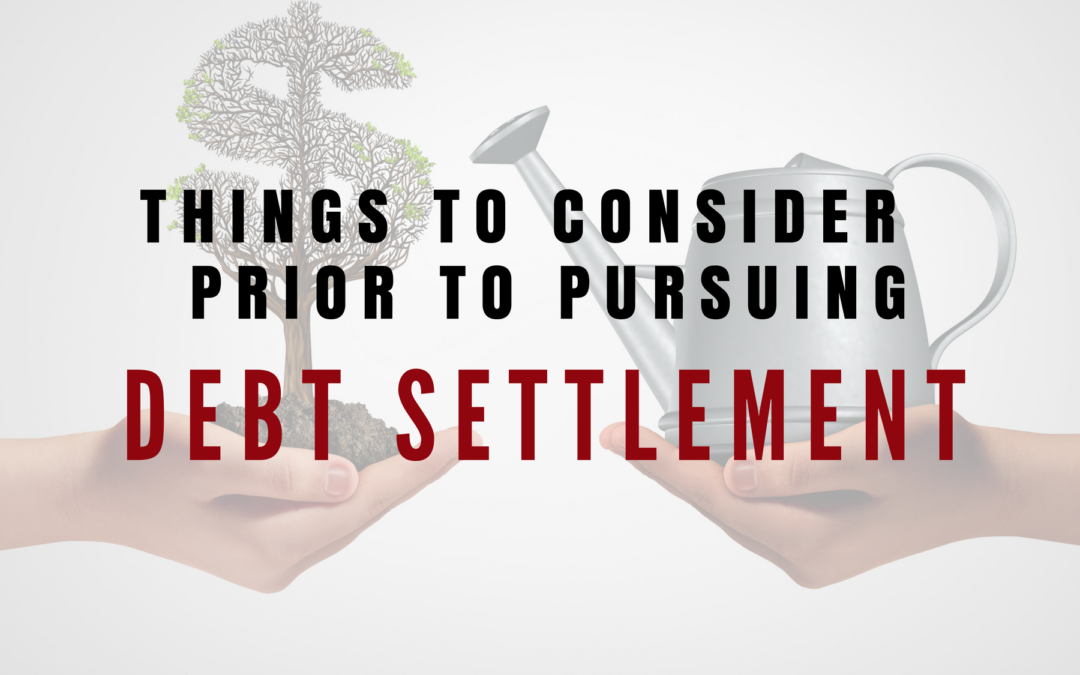
If you’re in debt, struggling to make payments, with credit cards maxed out, you have likely been feeling some overwhelm. It can feel like you are carrying the weight of the world on your shoulders. Having significant debt and high-interest rates can make it feel like you will never get ahead. If you’ve been searching for solutions, chances are good that you have stumbled across debt settlement options, which you may not yet fully understand.
Here are some tips and questions you can use assess your options and help you make your decision.
So, what is debt settlement (or debt negotiation)? This can be a good choice for someone who has been struggling to keep up with their minimum payments and feels there is no light at the end of the tunnel. A debt settlement/negotiation means that an arrangement has been reached with a creditor to settle a debt for less than the total amount owed.
Before you decide if debt settlement/negotiation is right for you, there are a few things to consider:
Debt settlement/negotiation will hurt your credit score.
This doesn’t mean it will be ruined forever, but you need to enter this process knowing that you will most definitely see a decrease in your credit score once you enter into a settlement arrangement. Initially, you will see your score drop if you have previously been up to date on your credit card payments. Once you enter into a settlement arrangement you will be encouraged to stop making your payments and this will result in a missed payment being reported to the credit bureaus. Once the debt settlement has been reached, it will appear on your credit report as a derogatory mark can remain there for up to seven years. With some positive credit behavior, it is possible to begin to reestablish your credit score within the first two years, but you need to be aware that there will undoubtedly be immediate consequences to your score.
Although the debt relief company will likely be able to negotiate a settlement, there are no guarantees.
Your creditor is not obligated to agree to a settlement and it is possible your creditor could sue you for repayment of the debt. If that happens and they win, they would be able to garnish your wages or even put a lien on your home. This is not a most common end result, but is a possible risk if you choose to pursue debt settlement/negotiation.
Last, but not least, you need to know that a high percentage of people don’t stick with the process long enough to reach their settlements.
Committing to these long-term payments can be tough when you haven’t done anything else to ensure you will be preventing the need for accruing any more debt along the way. This is why I advise clients to get a solid budget in place as soon as possible. Having a clear money plan in place will support you in reaching your debt settlement and prepare you for a better financial future.
Now that you are aware of the possible risks, here are some questions to also consider as you research this option.
Seeking help with a debt settlement can feel very overwhelming and there are many stories of debt negotiation scams out there. How can you know which companies are reputable? Here are some questions to ask while you do your research:
1) How do you get paid?
Does the company charge a flat fee or a percentage of the debt negotiated as their payment? A fee of 12-15% is pretty standard, so if you are talking with a company with a fee of 15-25%+, keep on looking.
2) Will I receive a copy of my settlement contract?
It’s important to ensure you will receive a written copy of each settlement offer reached with your creditor. You will want the official documentation for each debt settled for your records.
3) How long will the settlement process take?
Companies who boast they can reach settlements within only a few months overpromising. In most cases, a debt settlement will take 24-48 months, but occasionally a little less or a little longer, but saying settlements will be reached in as short as a few months is no painting an accurate picture.
4) What is your typical settlement rate?
Most reliable debt relief companies have been doing it long enough to have a fairly good idea of what they can expect from each creditor. For example, they may be able to say with confidence that they “normally” settle for around 40% of the total balance with Visa and only 60% with Discover. You want to work with someone who has a good pulse on what they can expect and the reality is that each creditor has a different way they handle settlements and some average much lower than others. If someone tells you they can settle for 30% on all of your debts….run.
5) What is your communication process?
Find out initially what to expect when it comes to communication. Will you receive regular updates? And how often are those “regular updates”? Some companies may do a monthly update, others quarterly, while others may only contact you once a settlement has been negotiated. Find a company who has a communication process that suits what you are looking for. If you are someone who will want frequent updates make sure this is something they offer as a standard. Otherwise, you may find yourself frustrated for many months while being in the dark about what is going on.
6) How will you pay off your settlements?
Many companies will require that you make a set monthly payment to them, that will be held in a third party trust account for you until a settlement is reached. You want to make sure that you will have access to the funds and any interest that is accrued. You should be able to withdraw the money at any time if you wish to stop the settlement. Work with someone who will offer monthly statements so you can always see what is happening with your money.
7) What happens if you pay more to your account than what is owed to settle?
Do they have a process in place for reconciling the difference between what you have paid into your account and what your debts have been settled for? If there are monies left over after the settlements have been reached find out if and how you can get these monies back.
Lastly, if you decide debt settlement is the answer, I highly encourage you to seek the guidance of a financial coach to help you create a clear spending plan for your money going forward. The most important part of this entire process is in learning how to break the cycle that got you into debt in the first place and a coach can help guide you along the way. To learn more about how I can help you, check my bio for a link to my website.
- Why balance transfers can't save you from your credit card debt - September 5, 2018
- What about my “Fun Money”? - August 2, 2018
- How to Know When You Can Leave Your 9-5 - July 11, 2018





